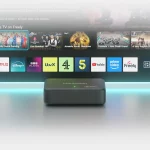Sponsored Links
The Conservative Party Pledges 100Mbps Ultrafast UK Broadband Again
Posted: 12th Mar, 2010 By: MarkJ
 The Conservative Party has just published its new 'Technology Manifesto' (.PDF), which reiterates everything that Tory Shadow Chancellor, George Osborne, told the BBC One Andrew Marr Show last month (here). It includes a commitment to deliver "100Mbps broadband across most of the population" by 2017 but still does not clarify what "most" actually means.
The Conservative Party has just published its new 'Technology Manifesto' (.PDF), which reiterates everything that Tory Shadow Chancellor, George Osborne, told the BBC One Andrew Marr Show last month (here). It includes a commitment to deliver "100Mbps broadband across most of the population" by 2017 but still does not clarify what "most" actually means.It also makes the claim that "this is up to 50 times faster than Labour’s planned broadband network," which appears to compare their 100Mbps plans with the government’s 2Mbps USC. However as we all know by now, the 2Mbps USC is completely separate from Labour's target of reaching 90% of the country with a "next generation broadband" network by 2017. On the other hand Labour has not defined a specific speed for this.
Manifesto Quote
We will be the first country in Europe to extend superfast 100 mbps broadband across most of the population. This is up to 50 times faster than Labour’s planned broadband network – and will open up new opportunities for the next generation of British high tech companies, and put Britain at an advantage when it comes to developing innovative online platforms and services.
We will unleash private sector investment to build this superfast broadband network by opening up network infrastructure, easing planning rules and boosting competition. This approach has proved successful in other countries such as Singapore and South Korea: these countries are global leaders in superfast broadband infrastructure.
If the market does not deliver superfast broadband in certain areas, we will consider using the proportion of the licence fee dedicated to digital switchover to finance superfast broadband roll out under the new BBC licence fee settlement, starting in 2012. This amount would be leveraged to maximise the investment made, either by making it available as loans or on a matched funding basis.
We will be the first country in Europe to extend superfast 100 mbps broadband across most of the population. This is up to 50 times faster than Labour’s planned broadband network – and will open up new opportunities for the next generation of British high tech companies, and put Britain at an advantage when it comes to developing innovative online platforms and services.
We will unleash private sector investment to build this superfast broadband network by opening up network infrastructure, easing planning rules and boosting competition. This approach has proved successful in other countries such as Singapore and South Korea: these countries are global leaders in superfast broadband infrastructure.
If the market does not deliver superfast broadband in certain areas, we will consider using the proportion of the licence fee dedicated to digital switchover to finance superfast broadband roll out under the new BBC licence fee settlement, starting in 2012. This amount would be leveraged to maximise the investment made, either by making it available as loans or on a matched funding basis.
To summarise; the Conservative's will force BT and possibly its competitors to open up their underground cable ducts, allowing rivals to install their own fibre optic cable without having to dig up extra roads. Nothing new with this either, they’ve said it a few times now.
Regulation on fibre optic will also be relaxed, although there's still no specific position on whether or not they will reduce the controversial Fibre Tax. Furthermore they will also use part of the BBC’s TV Licence fee (3.5% - the 'Digital Switchover' budget) to help fund the rollout of 100Mbps into rural areas.
Shadow Cabinet Office Minister, Francis Maude said:
"Our proposals will make the UK the most technology friendly Government in the world, introducing a right to government data, extending superfast broadband and creating a much more level playing field for SMEs."
"Our proposals will make the UK the most technology friendly Government in the world, introducing a right to government data, extending superfast broadband and creating a much more level playing field for SMEs."
Shadow Culture Secretary, Jeremy Hunt added:
"Our ambition is to ensure that the next generation of Googles, Microsofts and Facebooks are British companies. To achieve this we need to ensure we have a superfast broadband structure that gives the UK a competitive advantage over other countries. Our ambitious plans will make this happen."
"Our ambition is to ensure that the next generation of Googles, Microsofts and Facebooks are British companies. To achieve this we need to ensure we have a superfast broadband structure that gives the UK a competitive advantage over other countries. Our ambitious plans will make this happen."
By contrast Labour has two schemes. The first sets aside £250m and aims to make minimum broadband speeds of 2Mbps available to everybody in the country by 2012 (USC). The second proposes to put a new 50p +vat per month tax on all fixed phone lines in the country, earning £175m per year. This would fund the rollout of Next Generation Access (NGA) networks to 90% of the country by 2017.
A recent survey of ISPreview readers (here) showed that the 50p tax solution was hugely unpopular, with just 11.7% of respondents believing it to be the best way forward. 32% favoured the conservative plan to use part of the BBC's TV Licence fee, 24% wanted the Fibre Tax to be cut and a further 24% felt that private investment alone was the best fix.
It’s clear that more people appear to be behind the Conservative plan than the Labour alternative, although we’d still like to see more specifics and clarity on the ideas being put forward above, especially with regards to the Fibre Tax. It would be interesting to know where the Liberal Democrat party stands in all this but to date they have not responded.
On the bright side, at least both of the main government candidates actually have a position of NGA. That's a marked improvement from the last election when neither appeared to care about broadband.
Search ISP News
Search ISP Listings
Search ISP Reviews
Latest UK ISP News








Cheap BIG ISPs for 100Mbps+
150,000+ Customers | View More ISPs
Cheapest ISPs for 100Mbps+
Modest Availability | View More ISPs
Latest UK ISP News
Helpful ISP Guides and Tips
Sponsored Links
The Top 15 Category Tags
- FTTP (6850)
- BT (3900)
- Politics (3096)
- Business (2792)
- Openreach (2680)
- Building Digital UK (2523)
- Mobile Broadband (2498)
- FTTC (2148)
- Statistics (2145)
- 4G (2113)
- Virgin Media (2039)
- Ofcom Regulation (1790)
- 5G (1755)
- Fibre Optic (1610)
- Wireless Internet (1605)
Sponsored
Copyright © 1999 to Present - ISPreview.co.uk - All Rights Reserved - Terms , Privacy and Cookie Policy , Links , Website Rules































